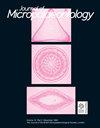波兰盆地侏罗系浮游有孔虫
IF 1.8
3区 地球科学
Q1 PALEONTOLOGY
引用次数: 2
摘要
摘要对波兰盆地皮大陆地层侏罗系(巴通阶-牛津阶)浮游有孔虫进行了研究。讨论了记录类群的古生态学、古生物地理学和生物地层学潜力。记录了四个物种:helvetojurassica锥藻(Haeusler,1881)、balakhmotovae球藻(Morozova,1961)、G.bathoniana(Pazdrowa,1969)和G.oxfordiana(Grigelis,1958)。这种组合可能是迄今为止欧洲大陆上描述的最具多样性的组合。记录的分类群被认为代表了三种不同的形态类型。海侵-海退相与记录在案的浮游有孔虫的古生物地理学之间的明确关系表明了一种与形态类型相关的深度分布模式,其中小型、简单、球形腔室的形态类型占据浅水,而稍大、更复杂的形态或半球形腔室的形态则占据更深、更开阔的水域环境。本文章由计算机程序翻译,如有差异,请以英文原文为准。
Jurassic planktic foraminifera from the Polish Basin
Abstract. Jurassic (Bathonian–Oxfordian) planktic foraminifera from the
epicontinental strata of the Polish Basin have been investigated. The
palaeoecology, palaeobiogeography, and biostratigraphical potential of the
recorded taxa are discussed. Four species are recorded: Conoglobigerina helvetojurassica (Haeusler, 1881),
Globuligerina balakhmatovae (Morozova, 1961), G. bathoniana (Pazdrowa, 1969), and G. oxfordiana (Grigelis, 1958). This assemblage is
probably the most diverse of those described to date from the epicontinental
areas of Europe. The recorded taxa are thought to represent three different
ecological morphotypes. The clear relationship between
transgressive–regressive facies and the palaeobiogeography of the recorded
planktic foraminifera indicates a morphotype-related depth–distribution
pattern in which small, simple, globular-chambered morphotypes occupied
shallow waters whereas slightly larger, more complex forms, or those with
hemispherical chambers, inhabited deeper and more open-water environments.
求助全文
通过发布文献求助,成功后即可免费获取论文全文。
去求助
来源期刊

Journal of Micropalaeontology
生物-古生物学
CiteScore
4.30
自引率
5.00%
发文量
7
审稿时长
>12 weeks
期刊介绍:
The Journal of Micropalaeontology (JM) is an established international journal covering all aspects of microfossils and their application to both applied studies and basic research. In particular we welcome submissions relating to microfossils and their application to palaeoceanography, palaeoclimatology, palaeobiology, evolution, taxonomy, environmental change and molecular phylogeny.
 求助内容:
求助内容: 应助结果提醒方式:
应助结果提醒方式:


